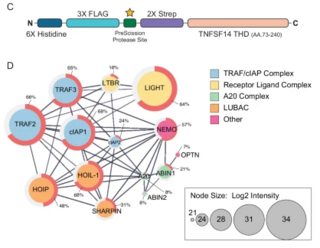- Researchers from the UCL Cancer Institute in London, the University of Cologne, the IIS Aragón, the University of Stuttgart and the Tri-Service General Hospital in Taipei have made a ground-breaking discovery in the field of cancer biology, identifying LUBAC (Linear Ubiquitin Assembly Complex) as a key element in the pro-tumorigenic signalling of the lymphotoxin β receptor (LTβR).
- The LTβR receptor is known for its role in the development and maturation of lymphoid organs and is essential for the proper functioning of the immune system. Despite its importance, a detailed understanding of how its signalling works has been lacking until now.
- The authors have demonstrated that this new mechanism can also be observed in other types of cancer cells, besides liver cancer, suggesting that it could be a more general pro-tumorigenic mechanism.
Cologne, London, Zaragoza, Stuttgart, Taipei, 30th August 2024 — Researchers from the UCL Cancer Institute from University College London, the CECAD Research Centre and Centre for Biochemistry of the University of Cologne, the Aragón Institute of Health Research (IIS Aragón), the University of Stuttgart and the Tri-Service General Hospital in Taipei have made a ground-breaking discovery in the field of cancer biology, identifying the Linear Ubiquitin Assembly Complex (LUBAC) as a key element in the pro-tumourigenic signalling of the lymphotoxin β receptor (LTβR). This work, published today in the prestigious journal Cell Death and Differentiation of Nature Publishing Group, has significant implications for understanding the molecular mechanisms of tumour development induced by inflammation, particularly in liver cancer.
The LTβR receptor is well known for its role in the development and maturation of lymphoid organs and is crucial for the proper functioning of the immune system. However, its activation also promotes the spread and growth of tumours by triggering the secretion of proinflammatory factors. Despite its importance, a detailed understanding of how LTβR signalling works had been lacking until now.
In this study, co-led by Professor Henning Walczak, Dr. Diego de Miguel and Professor Nieves Peltzer, and conducted by Dr. Yu-Guang Chen and colleagues, it was discovered that LUBAC is an essential and previously unrecognised component of the LTβR signalling complex (LTβR-SC). They found that the linear ubiquitin chains generated by LUBAC facilitate the recruitment of various factors necessary to modulate LTβR signalling, cooperatively regulating the balance between canonical and non-canonical NF-κB signalling. Thus, LUBAC is responsible for generating the secretion of proinflammatory and pro-tumorigenic cytokines following LTβR activation through the activation of the canonical NF-κB pathway.
This newly discovered mechanism appears to be particularly relevant for patients with liver cancer. In this regard, as Dr. Chen states, "Based on our innovative biochemical findings on LTβR signalling, we performed a bioinformatic analysis indicating that high expression of LTβR along with high expression of LUBAC correlates with poor prognosis in liver cancer patients. This highlights the clinical importance of LTβR and LUBAC-mediated inflammatory signalling."
The authors show that the same mechanism is also at work in other types of cancer besides liver cancer, suggesting that it could be a more general pro-tumorigenic mechanism. Professor Walczak states, "In this study, we redefine how LTβR signalling works and show that it is crucial for pro-tumourigenic NF-κB activation in various types of cancer." Dr. de Miguel adds, "Although our study primarily focuses on liver cancer, similar mechanisms could be behind the development of other cancers known to be driven by inflammation. Future studies will reveal this." Finally, Professor Peltzer emphasises the immediate clinical relevance of the study's results: "Our findings have the potential to develop patient stratification biomarkers and therapeutic strategies targeting LUBAC activity."
This discovery represents a significant advancement in our understanding of the molecular basis of LTβR signalling and its role in cancer progression. The researchers are optimistic that these insights will pave the way for new therapeutic approaches to improve outcomes for liver cancer patients.
